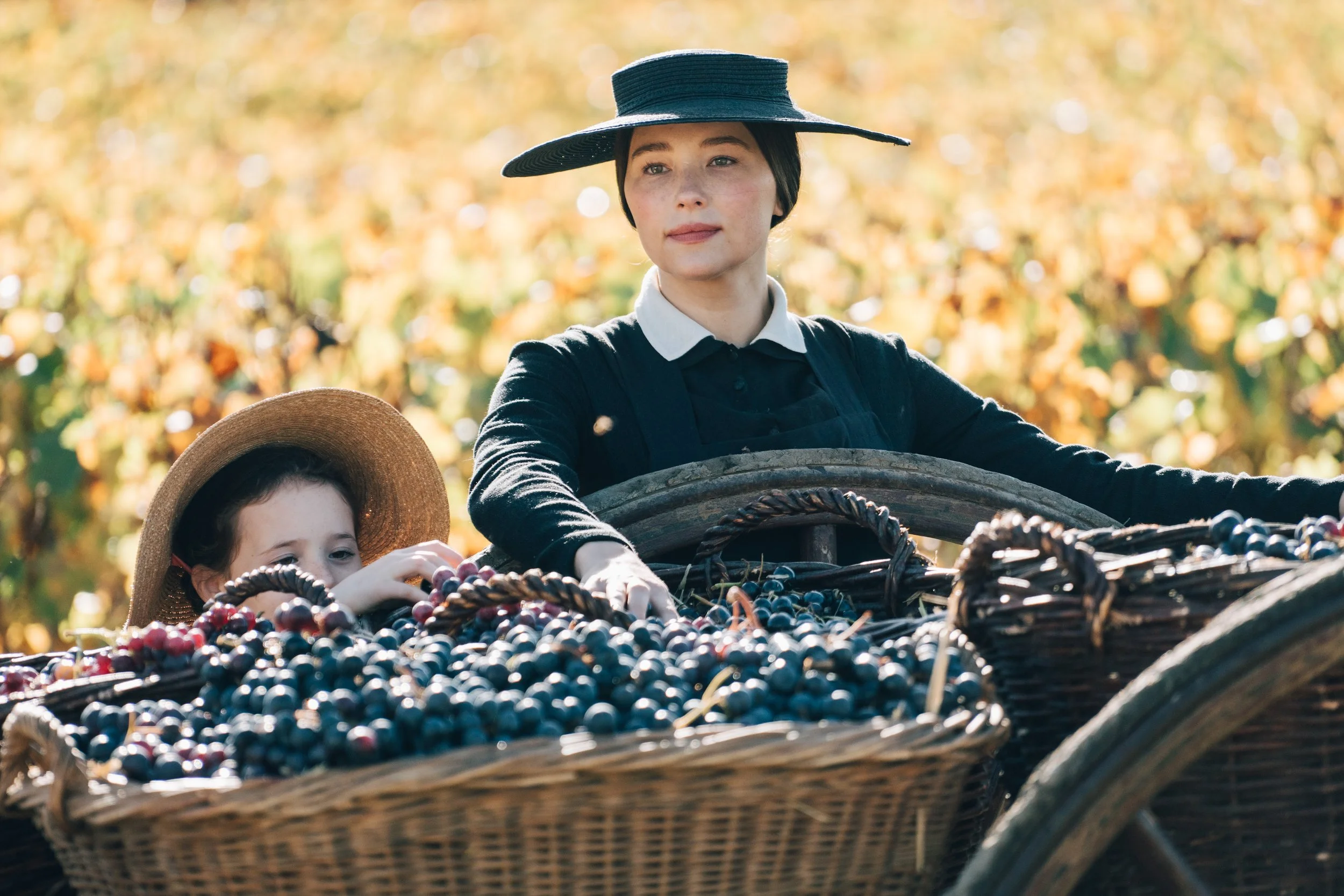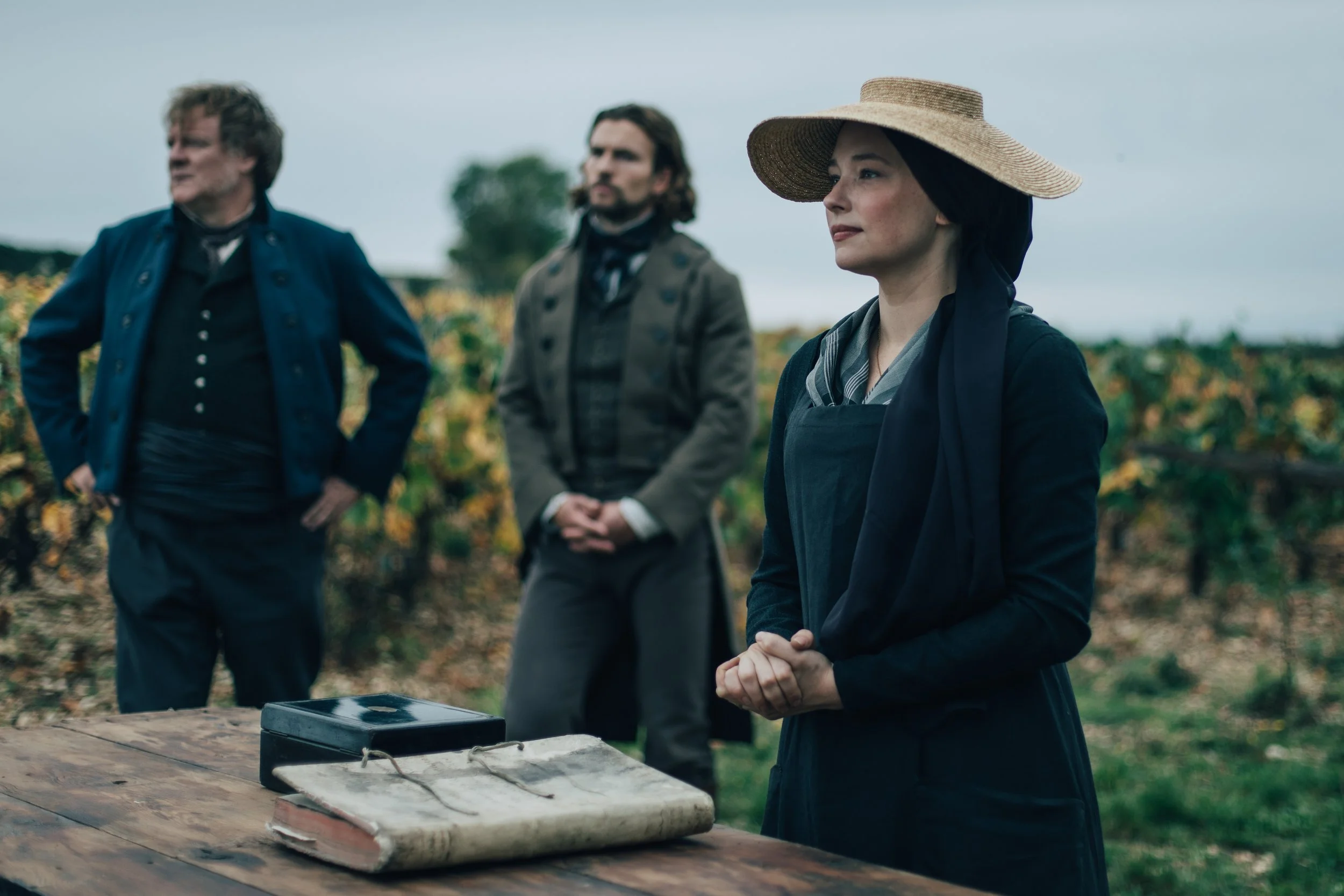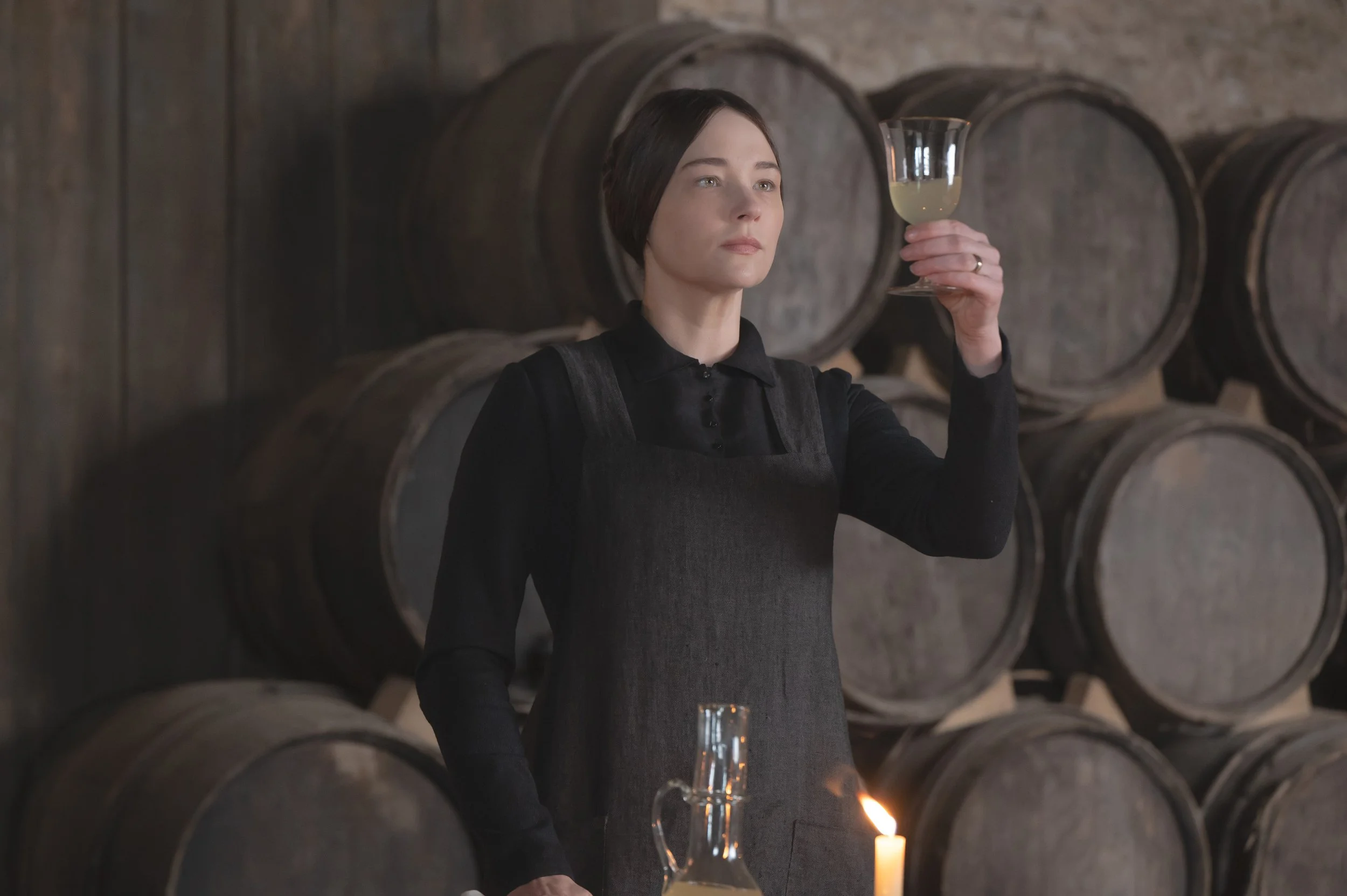Cracking Champagne: Haley Bennett and Director Thomas Napper Talk ‘Widow Clicquot’
by CHAD KENNERK
Based on the life of French icon Barbe-Nicole Ponsardin and Tilar J. Mazzeo’s best-selling book, director Thomas Napper’s Widow Clicquot serves a sparkling look at the trials and triumphs of one of France’s greatest winemakers.
Shot entirely on location in France, mainly in the Chablis region, the film focuses on Madame Clicquot’s (Haley Bennett) life on the vineyard following the sudden death of her husband François (Tom Sturridge). Faced with embargoes brought on by the Napoleonic war, she formulates a bold plan with the vineyard’s wine merchant, Louis Bohne (Sam Riley), to steer the vineyard toward success and continue the legacy that she and her husband began. Napper explained, ”Like Sunset Boulevard, the story begins with an unexplained corpse, a young husband, François Clicquot and a newly created widow, aged 26. One strand of the film slowly fills the gaps of a life lived and then tragically lost. If you like, this part of the film is travelling backwards. The present tense of the story navigates the life of Barbe-Nicole Ponsardin Clicquot as a young widow - her struggle to become the proprietor and then desperately trying to continue the work she had started with her husband.”
Regarding the non-linear narrative structure, Napper describes the film as an intertwining battle between present-day 1806 and memories of married life in 1799. “I saw it immediately as a unique and personal ghost story, full of emotion and very much tied to the psychogeography of the house and the vineyard where she lived.” Most of the production took place in Burgundy at the historical Chateau de Beru, a substitute for Verzy, where the renowned Veuve Clicquot champagne was brought to life in the early 1800’s. Like the struggling vines in the story, the production faced numerous challenges over its 30-day November shoot — a common month for rain. Napper shared that the cast and crew seemed perpetually covered in “the deep mud of a French November.” With autumn in the air, the production also faced the challenge of creating an onscreen summer and winter from a wet autumn.
With personal guidance from the brand’s archivist, the cast and crew gained an inside look at the champagne empire and the woman who forged it. As Widow Clicquot arrives in theatres from Vertical Entertainment, Film Review toasts director Thomas Napper and the film’s star and producer Haley Bennett on capturing the subtle notes of Barbe-Nicole’s effervescent metamorphosis.
In conversation with Haley Bennett and director Thomas Napper.
Film Review (FR): Haley, you imbued Barbe-Nicole with unabashed tenacity and determination, yet everything she does feels like an act of love. What was your preparation like in discovering and working on this character?
Haley Bennett (HB): First of all, I’m just so excited to introduce this character to audiences. Veuve Clicquot is a French icon and she’s known as the Grande Dame of Champagne in France. I just want her story to be known and told for American audiences. It’s a really exciting opportunity. Unless you’re a history buff or a wine connoisseur, you don’t know that Veuve means ‘widow’ and that the creator of Veuve Clicquot was a 27-year old widow during Napoleon's reign. She achieved so much during this period of time when women weren’t allowed to have bank accounts and they weren’t allowed to run businesses. It was a really exciting opportunity to shine a light on a very important woman in history.
In terms of my preparation, I loved Clicquot’s love for nature and her connection with the Divine. There’s the branding aspect of the film, but what was interesting for me, was to tell a story about a shy, timid girl and her transformation; her transition into a creative and powerful force. A force of nature. A woman that was audacious and brave, especially during this period. She was smuggling wine across borders and doing it her way, without a man. I thought that was really an exciting opportunity.
(FR): Thomas, from the opening shot of Barbe-Nicole seeing the vineyard through François’ hands, there is a dichotomy between her confinement and her ability to see beyond it — and to ultimately thrive within it. She’s seen through a mourning veil, framed looking through windows, peering through a wine glass, etc. How does that dichotomy help illustrate Barbe-Nicole’s journey?
Thomas Napper (TN): That’s a lovely question. Haley showed me a painting when I first arrived on the project. A painting by Edvard Munch which was a painting of a women, but in three phases of her life – a woman in black and a woman in white on one side and a woman in red in the middle who was dancing with her lover. We were so inspired by this painting and the idea of the separate identities of a woman, but of one woman in different phases of her life.
We have in the film, mainly these two stories that we go down, one which is her younger life and then her later life in grief and it moves between the two. When we were filming, I was very interested in the idea of the house being representative of the self. The idea that she stayed within the house and the property the rest of her life is actually true. After her husband died, she remained on the vineyard and so I found that really fascinating – the idea that she stayed in this place where this terrible event had happened.
I felt the story kind of unfolded in a way where she is in the present, but she is in the same space where something happened in the past. Looking through windows in the courtyard, she would remember a moment in the past where she had also looked through that same window. When she’s in the kitchen cleaning glasses, she remembers making love to her husband in the scullery next door. There are these constant attachments to the past, but it’s using the house as a kind of window frame into her previous life.
(HB): I feel the film is very atmospheric, it’s very tactile. I think that really lends itself to the beauty, the atmosphere, of reviewing a touch or a taste. It’s all about the senses. I feel the film is very sensual. I think it’s something that, just to touch on what you were saying, it’s all about touch or taste or sight. Seeing something would evoke a memory, touching something would evoke a memory, tasting something evokes a memory. Isn’t that so true to life? I think you really captured memory so beautifully, Thomas. Those kinds of senses are something that we embody.
HALEY BENNETT is an American actress, producer, and writer. She made her film debut in the romantic comedy Music and Lyrics in 2007. Bennett previously starred in Magazine Dreams, which won the US Dramatic Special Jury Award: Creative Vision at the 2023 Sundance Film Festival. Additional credits include The Girl on the Train, The Magnificent Seven, The Equalizer, Devil All the TIme, Hillbilly Elegy, Till, and Joe Wright’s Cyrano.
Bennett’s accolades include the award for Best Actress at the 2019 Tribeca Film Festival for her performance in IFC Films’ Swallow—also her producing debut. She has also received the New Generation Acting Award at the International Film Festival of the Art of Cinematography Camerimage and in 2023, the Progressive Lifetime Achievement Award at the Rome Film Festival. Bennett was also seen in director Gregg Araki’s film Kaboom which was the first film to receive the Queer Palm Award at Cannes Film Festival in 2010.
Bennett can next be seen in Lionsgate’s action-comedy film Borderlands, directed by Eli Roth. Bennett is also writing a film alongside writer Marteinn Thorsson entitled After Midnight with David Cronenberg set to co-produce. Bennett most recently wrapped production on the thriller Press Your Luck.
THOMAS NAPPER is a director and passionate gardener. Napper’s debut feature Jawbone, starring Johnny Harris, Ray Winstone and Ian McShane, was nominated for seven BIFAs and received a Bafta Nomination for Best Debut feature. In 2010, he directed the award-winning Paramount/Participant feature documentary Lost Angels: Skid Row is My Home, following the lives of eight residents of Skid Row as they try to rebuild their lives after being homeless for years. In 2018 Thomas was one of the lead directors for the BBC series World On Fire. Thomas is currently in pre-production on a new project The Man Who Stole Portugal and just wrapped on the third season of Amazon/Sony’s Wheel of Time, a series for which Napper has previously directed. Napper was also a second unit director for films such as Guy Ritchie’s Aladdin, Mary Poppins Returns, The Darkest Hour, Bill Condon’s Beauty and the Beast, Into the Woods, Anna Karenina, Atonement, and Joe Wright’s Pride & Prejudice.
Widow Clicquot is available from Vertical Entertainment 19 July.




